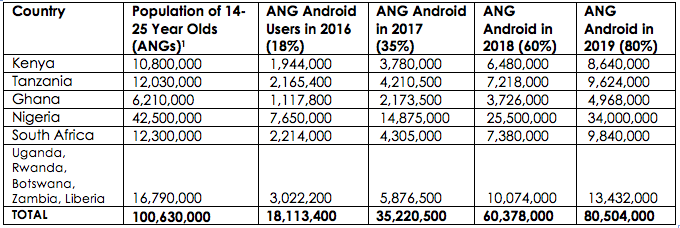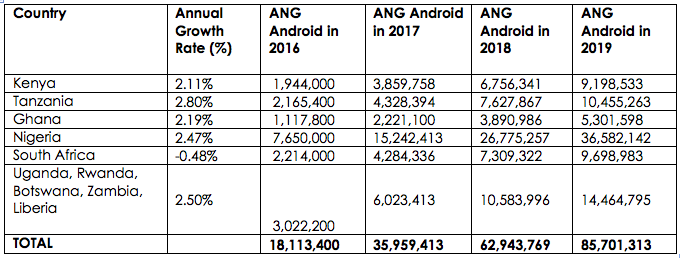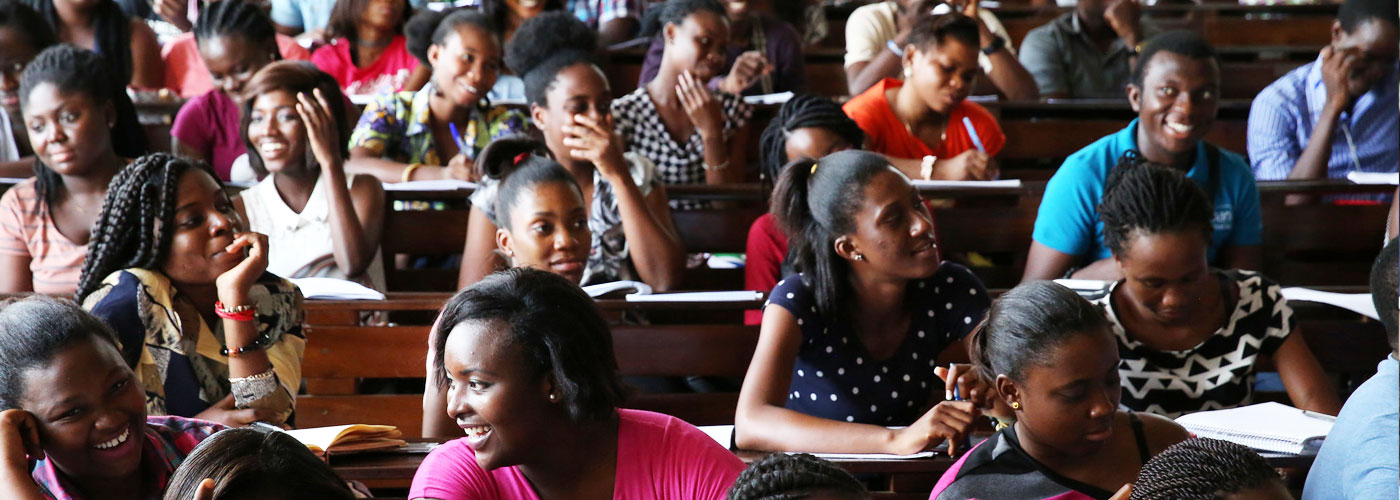Eneza Education is a for-profit social enterprise based in Nairobi, Kenya. Through our SMS, web, and soon to be Android products, we provide students and teachers with courses aligned to the local curriculum. We also enable learners to chat with live instructors and professionals in what we call our “virtual classroom.”
Africans aged 14-25 are a huge business opportunity that many entrepreneurs are starting to see. Tweet This Quote
To date, Eneza has reached over 600,000 (offline) unique users in Kenya and Ghana. Every day, our team calls around 300 of our current users to get demographic information as well as educate them on cost and value of the product.
When we analyzed our typical 70,000 monthly active users (well, 135,000 MAUs this month) in Kenya, we found the following to be true:
- Around 30% of our most active users are out of school—these are our super users.
- There is a high demand for formal secondary school content (local or international) for a broad age range (14-30 years old), whether the user is in school or not. This is important to note. Many people want to throw typical “vocational” content at any and all dropouts, but the demand is for formal content, too.
- Our users wanted to chat with us on WhatsApp, meaning they have smartphones.
Thus, we made a strategic decision to focus on two things: 1) An older market than our usual 10-14-year-olds; and 2) Launching our Android app to the market.
When I was doing market research last month for our new financial model, I came across amazing stats on Android growth and the potential of 14-25-year-olds as customers in the African market. This matched the direction of what we see with our own subset of users.
When it comes to spending power and a burgeoning consumer market, 14-25-year-olds in Africa are an amazing market. Tweet This Quote
Here’s what I found: 14-25-year-olds are going to be THE market to hit in Africa.
Let’s call these adolescents and young women and men ANGs for short (Africa’s Next Generation). ANGs are a huge business opportunity that many entrepreneurs are starting to see. International companies are starting to focus their attention on the last “untapped” market in the world. When it comes to spending power and a burgeoning consumer market, 14-25-year-olds on The Continent are an amazing market to hit for the following reasons:
- ANGs account for a HUGE percentage of the population in Africa, especially as the population quadruples in the next 35 years.
- ANGs are buying Android phones.
- ANGs are spending > 20% of their income on these Android phones and their services.
- ANGs are connected and empowered.
Furthermore, 58% of new phones in the market are Android, and 18% of all phones specifically in the Kenyan market right now (Q4 2015) are Android. In one study, 19% of Kenyans report making app downloads. In Ghana, it’s 31% and in Nigeria it’s 28%. In South Africa, Android phones in the market are tripling every 18 months.
To further understand these trends, below are charts I created from the data I compiled on population and Android growth:
14-25-Year-Old Market in English-Speaking (or English-Friendly) Africa

(based off of these population estimates)
That’s 80.5 million potential Smartphone/Android users by 2019—a huge market.
Adjusted for Simple Population Growth Rates

This number jumps to 85.7 million when you take into account population growth, assuming South Africa’s population declines as predicted.
If a certain percentage of the market pays $12 per year (like they do for our educational service already), this is the revenue potential:
Being as conservative as possible, you can see this is a $50 million market by 2019. And, you can argue that the revenue potential is actually much higher if you take into account the numerous layers of revenue streams that are attached to this consumer base.
What about if they pay a bit more, say $20 a year?
They pay a little more, and this number increases quite a bit to a potential of $85.7 million.
Combine a consumer model with a few select corporate customers, and you have one viable business. If that doesn’t make a B2C market in Africa enticing, I’m not sure what else can. I haven’t even included French-speaking Africa in these estimates, let alone the fact that India is a very viable market to expand to out of Africa.
While a bunch of VCs are investing in the latest SaaS company out of Silicon Valley, perhaps they should be looking to Africa for the next unicorn. Tweet This Quote
The problem is many entrepreneurs are scared to enter the B2C arena in Africa. So far, the telecoms are winning the market, and a few select companies such as iROKO, Paga, and Zoona are seeing some great traction. Also, not as much capital as you would expect is going into B2C models in Africa. Simply put, most investors have no idea how to scale a consumer brand in Africa.
At a workshop in Chicago last month, one presenter mentioned that B2C focused companies are so few and far between, who would want to focus on that as a business model? I hear words floating around like “saturated,” “tapped out,” and even “insane,” when it comes to building a B2C company in the States, especially if you want to dive in to the EdTech, FinTech or even general social space. I guess it’s insane if you only see one market and ignore this huge continent on the other side of the Atlantic.
But, if you turn your attention away from the ANG market that’s ready to spend money, you are missing out on the next big thing. While a bunch of VCs are investing in the latest SaaS company out of Silicon Valley, perhaps they should be looking to Africa for the next unicorn. The potential is here.
Interested in Eneza Education?





